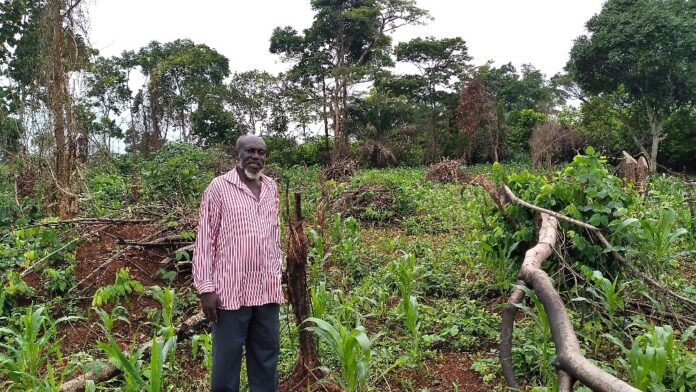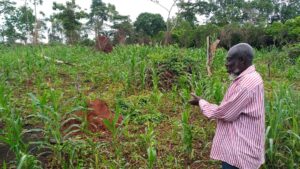
Winful Asamoah Yirenkyi, a professional teacher who retired in 2015, is for the first time in his life cultivating a farm.
With a career spanning over 30 years, he has tutored English Literature in basic and second-cycle institutions and has also been a district education officer.
At 66, Mr. Asamoah Yirenkyi’s quest to keep active and healthy as advised by his doctor motivated him into agriculture.
“I went for surgery and the doctor explained that I am very strong except my pelvic floor is weak and could only strengthen if I get active. He suggested I enter into subsistence farming and here I am”, he explained.
Agriculture is essential to Ghana’s economy. It has a greater impact on poverty reduction than other sectors and is critical for rural development and its associated social stabilization, environmental sustainability, and buffer during economic shocks.

According to the Ministry of food and agriculture, the sector provides employment for over 44.7% of the populace in the country. It serves as a major source of foreign exchange, Ghana exported non-traditional agricultural commodities worth 1,901 million cedis in 2016. It also contributes about 20% to the annual GDP and serves as a major source of food whilst providing raw materials for industries.
Small-sized and medium-sized farms of up to 10 hectares account for 90% of cultivated lands.
After six weeks of planting 700 seedlings of cocoa, 500 suckers of plantain, and maize on one and a half acres of land, Mr. Asamoah Yirenkyi is filled with joy to see his maize tussling, suckers sprouting and cocoa showing good signs of life.
Though agriculture in Ghana is faced with some development issues, the government over the years through policies like planting for food and jobs continues to make huge investments in the sector.
Mr. Asamoah Yirenkyi explains that most of his cocoa seedlings and plantain suckers were procured for free from MOFA.
He plans of selling harvests from cash crops and most of the food crops he has cultivated.
“What I’m doing is semi-subsistence. I’ll get some crops to feed on and can get some to sell’, explained.
So far, over 3,000 cedis has been invested in labor, planting materials, and weedicides.
Source: Ghana/Starrfm.com.gh/103.5fm/Kwame Eli Senyega

